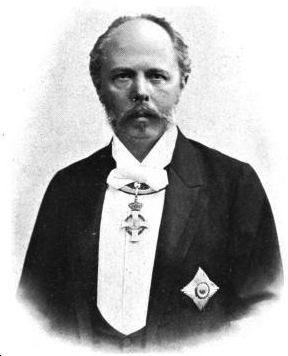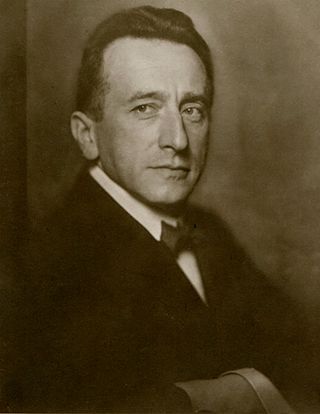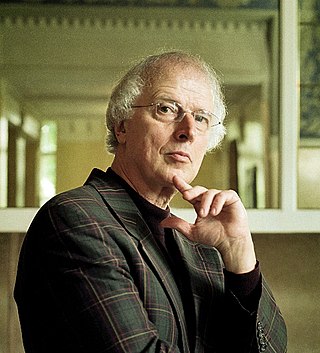Kapellmeister, from German Kapelle (chapel) and Meister (master), literally "master of the chapel choir", designates the leader of an ensemble of musicians. Originally used to refer to somebody in charge of music in a chapel, the term has evolved considerably in its meaning and is today used for denoting the leader of a musical ensemble, often smaller ones used for TV, radio, and theatres.

Johann Adolph Hasse was an 18th-century German composer, singer and teacher of music. Immensely popular in his time, Hasse was best known for his prolific operatic output, though he also composed a considerable quantity of sacred music. Married to soprano Faustina Bordoni and a friend of librettist Pietro Metastasio, whose libretti he frequently set, Hasse was a pivotal figure in the development of opera seria and 18th-century music.
Jan Dismas Zelenka, baptised Jan Lukáš Zelenka was a Czech composer and musician of the Baroque period. His music is admired for its harmonic inventiveness and mastery of counterpoint.

Ernst Edler von Schuch was an Austrian conductor. He became famous through his working collaborations with Richard Strauss at the Dresden Court Opera.

Fritz Busch was a German conductor.

Leo Blech was a German opera composer and conductor who is perhaps most famous for his work at the Königliches Opernhaus from 1906 to 1937, and later as the conductor of Berlin's Städtische Oper from 1949 to 1953. Blech was known for his reliable, clear, and elegant performances, especially of works by Wagner, Verdi, and Bizet's Carmen, and for his sensitivity as an accompanist.

Udo Zimmermann was a German composer, musicologist, opera director, and conductor. He worked as a professor of composition, founded a centre for contemporary music in Dresden, and was director of the Leipzig Opera and the Deutsche Oper Berlin. He directed a contemporary music series for the Bayerischer Rundfunk and a European centre of the arts in Hellerau. His operas, especially Weiße Rose, on a topic he set to music twice, have been performed internationally, and recorded.

Carl Gottlieb Reißiger was a German Kapellmeister and composer.
Carl Ueter was a German composer of classical music. From 1950 to his retirement in 1965 he was professor at the Hochschule für Musik Freiburg.
Hans Herbert Jöris was a German conductor and academic teacher who worked at the Theater Dortmund and the Staatsoper Hannover and taught at the Hochschule für Musik, Theater und Medien Hannover.

Johannes Schüler was a German conductor. He held leading positions at opera houses such as the Berlin State Opera and the Staatsoper Hannover. He promoted contemporary music, leading the world premieres of Alban Berg's Three Pieces for Orchestra in 1930, and Henze's Boulevard Solitude in 1952.
Walter Schartner was a German conductor, composer and Hochschullehrer. In 1946, he was appointed Generalmusikdirektor in Halle and as such he directed the Orchestra of the Halle Opera House. In 1949/50, he was chief conductor of the Philharmonisches Staatsorchester Halle.
Hans Müller-Kray was a German conductor, music director and academic teacher.
George Washington Pittrich was a German composer and Kapellmeister.
Fritz Reuter was a German musicologist, music educator, composer and Kapellmeister. Reuter was one of the most important German music educators of the 20th century. After studying music and musicology in Dresden and Leipzig, with Teichmüller, Riemann, Schering and Abert, he received his doctorate in 1922. In 1945, he was appointed Kapellmeister at the Volksoper in Dresden. In 1949, he was appointed as the first professor of music education at a German university. He was also director of institutes at the Martin Luther University of Halle-Wittenberg and the Humboldt University Berlin. In 1955, he was one of the initiators of the first Hallische Musiktage.
Volker Rohde was a German conductor and academic teacher. After being principal conductor of the Orchester des Opernhauses Halle from 1976 to 1979, he subsequently served as deputy principal conductor at the Semper Oper Dresden and as musical director at the Oper Leipzig.
Anthony Bramall is a British conductor.

Karl August Krebs, also Carl, Miedtke, was a German pianist, composer, conductor and Kapellmeister.

Hans Drewanz was a German conductor and academic teacher. He was the Generalmusikdirektor (GMD) of Darmstadt for more than three decades, shaping musical life in the town especially at the Staatstheater Darmstadt.
Frank Petzold is a German composer, conductor and jazz pianist. A composer of operas and other stage works, he has worked at theatres, from 1994 as Kapellmeister at the Staatstheater Cottbus. He has lectured music theory and jazz piano at the Brandenburgische Technische Universität in Cottbus from 2001.









